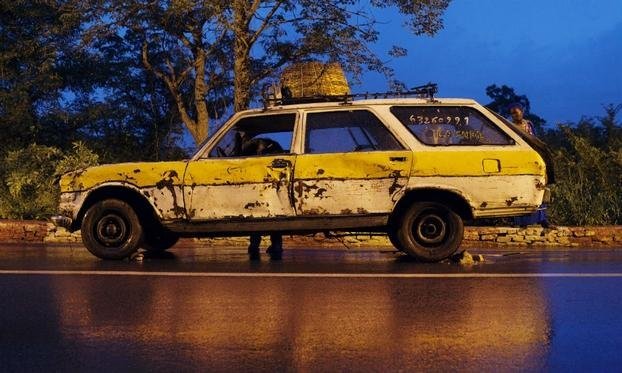Peugeot 504: A French Warhorse in Africa

The indefatigable wagon, based on the sedan produced by the French automaker starting in 1968, remains the mainstay of the cross-border bush taxi trade in the region. Millions depend on the vehicles to visit relatives or trade goods between countries such as Mauritania, Senegal, Mali, Burkina Faso and Guinea
Local cab-owners jack up the rear-end to provide greater ground clearance, then add a third bench in the back of the car to pack in even more passengers -- typically a total of eight plus the driver.
The bodywork is then festooned with stickers, favorite maxims (Chaque jour est une vie -- French for "Each day is one life") or professions of faith, including sometimes the name of the driver's local religious leader or "marabout." Luggage - and the occasional live goat -- are stored on the roof rack.
A 500-mile (800km) trip currently runs at about 20 euros ($27) per passenger, or slightly more for those wanting a seat by the window or up-front with the driver.
"Even if some say it's old and only good for the breaker's yard as soon as you find some spare parts it finds a new life," said Insa Diaw, 56, a Senegalese cabbie who has been driving his 504 since 2002.
A lively trade in second-hand spare parts from France and an abundance of mechanics mean that even in West Africa's smallest villages, it is possible to get a broken-down 504 back on the road within an hour.
For nearly four decades until the mid 2000s, the 504 was assembled in Nigeria. But in the past decade it has been shunned by Africa's growing middle-class for whom the Toyota Land Cruiser became a status symbol in the same way that Europe's middle class aspire to a Mercedes-Benz.
A Land Cruiser is well beyond the means of the average taxi driver, whose tight daily cash flow means he often has to resort to buying just $1 or $2 of gas at a time as he waits for his next fare. "But I can tell you," said Diaw, "if you know how to drive a 504 properly, it can go places where a four-wheel drive can't."


